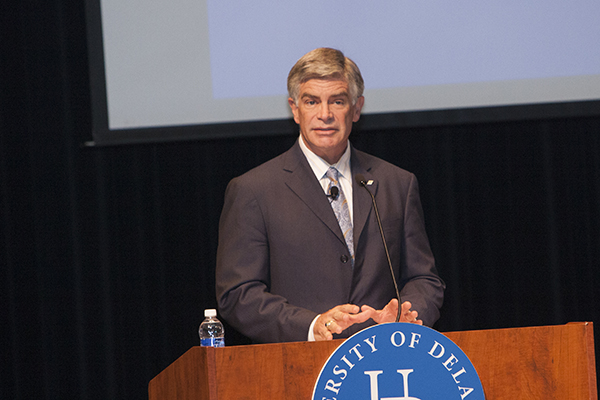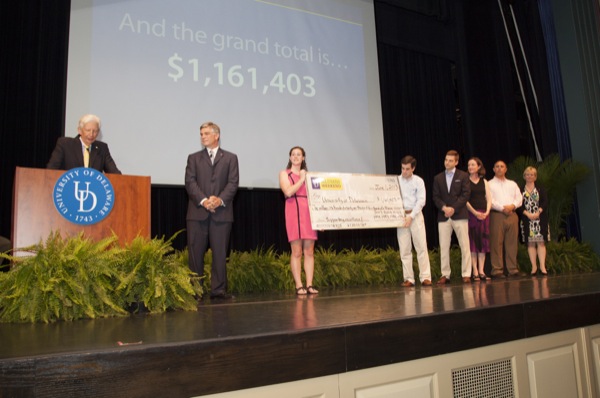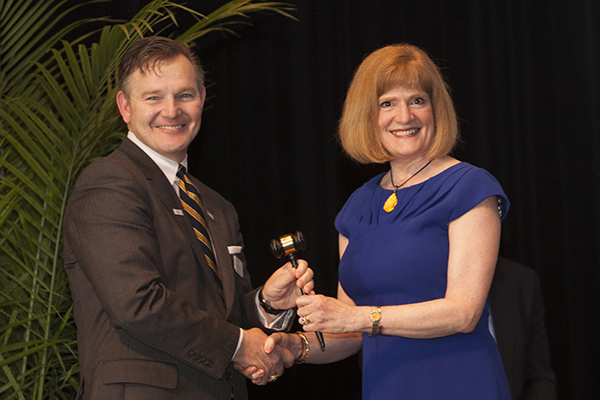


State of University
President presents highlights of year in annual Alumni Weekend address
1:24 p.m., June 3, 2013--The University of Delaware has made significant progress in the key areas identified five years ago by the institution's strategic plan, with additional initiatives under way to continue that progress and to meet new challenges.
UD President Patrick Harker delivered that assessment on Saturday, June 1, in his annual State of the University address before a large audience of faculty, staff, alumni and friends in Mitchell Hall. The talk, which this year featured photos and short videos highlighting students and programs, was part of Alumni Weekend activities.
Campus Stories
From graduates, faculty
Doctoral hooding
Harker outlined the goals that were first laid out in 2008 to guide the University forward: excellence in undergraduate, graduate and professional education; recognition as a premier research university; leadership in environmental education, research and technology; engaged global citizenship; and a sustained dedication to public service.
Those goals can be evaluated in terms of statistics, which Harker said are important and show the University's many recent accomplishments, but he noted that another measure of UD's success can be seen at each Commencement, with some 4,000 brand-new graduates.
"It's immediately obvious that no number, no statistic, no trend line can match those 4,000 stories," he said. "If you want to describe our mission, that's where you have to start."
Next year's incoming class, for example, is high achieving and highly diverse. That variety of backgrounds and experiences, Harker said, helps create "this amazing tradition" of students learning and growing together, teaching and transforming one another.
"Our guiding belief [is] that diversity is central to higher education — that the process of learning hinges on expanding one's viewpoint, on being exposed to many different perspectives by many different people," he said.
Harker also told the audience about students who, through their experiences at UD, have dedicated their lives to helping abandoned babies in South Africa, completed sustainability projects in Cameroon and Guatemala, delivered vaccines to children in Peru, went to Bangladesh to study the causes of maternal mortality and traveled in the U.S. taking the pulse of Americans' political opinions.
All the student achievements and the University's progress toward its goals are made possible in large part by generous alumni who fund scholarships, offer internships or jobs and support a professor or a program that forever changes a student's life, Harker said. With UD now in the planning phase for its next comprehensive campaign, he thanked the audience members for their support over the years and encouraged them to continue to help.
"College is an accumulation of once-in-a-lifetime opportunities, and you make so many of them possible," he said.
Other highlights of the State of the University address were a historical overview of UD's study abroad program — the first in the nation, now celebrating its 90th anniversary — as well as updates on construction of the Interdisciplinary Science and Engineering Laboratory (ISE Lab) and new residence halls on the site of the former Gilbert complex.
Opening to students for fall semester, ISE Lab will provide much-needed student classroom and laboratory space in addition to leading-edge research facilities. UD is already well known for its use of problem-based learning, in which students work in teams and on practical applications to solve real-world problems, but Harker said the new building will be "a temple" to that instructional process.
The new freshman residence halls continue a move to consolidating more student housing on the east side of campus, "creating a locus for student interaction and activity — in a bid to strengthen the bonds of lifelong friendship," Harker said. The two new residence halls will be named for UD's first and third president, Eliphalet Gilbert, and for civil rights pioneer Louis Redding, the attorney whose 1950 lawsuit dismantled racial segregation at the University.
In answer to questions from the audience after the speech, Harker said UD is studying and has already expanded its use of technology to offer more accessible, affordable online course options. But, he said, the University is proceeding cautiously to ensure that high quality and academic rigor are maintained.
With increasing national concerns about the cost of higher education and student debt, he said UD is always mindful of "the Holy Grail — lower cost and higher quality."
Reunion classes give back
At the beginning of the State of the University event, Harker accepted what he called "incredibly generous" gifts from the seven classes marking reunions this year, including the newest alumni, for a total donation of $1,161,403.
The Class of 2013, which graduated just a week earlier, announced record-setting participation in the Senior Class Gift effort, raising $16,607 from 29 percent of its members.
Other gifts were presented by the reunion classes of 2008, which gave $46,921; 2003, $44,682; 1998, $109,936; 1993, $143,621;1988, $130,501; and 1963 — the newest members of the 50-year-anniversary Gold Guard — who gave $669,135.
"I thank all of you for giving back to UD, for valuing what we do here and for helping us do it even better," Harker said.
UD Alumni Association update
Darelle Lake Riabov, a 1973 alumna who has served as president of the UD Alumni Association (UDAA) for the past two years, gave a State of the Association talk at the event before turning over the office to Ken Jones of the Class of 1980. The association represents some 163,000 current alumni.
Riabov said the UDAA board created a strategic plan in 2009 and has implemented numerous changes with that plan in mind. Among the many successes, she said, are new annual activities — from a freshman class banner signing to a new-alumni pinning ceremony at Commencement — designed to make students aware of the association even before they graduate and automatically become members.
The UDAA also has implemented a regular open house to increase the number of alumni interested in serving on the board and to keep former board members engaged after their terms of service end. And, a variety of volunteer activities have been developed to allow those board members to continue their involvement with the University.
Riabov said the association's focus isn't just on campus. The UDAA has increased its financial support to affinity groups and regional alumni clubs, working in partnership with the Office of Alumni Relations, to encourage connections among alumni and with the institution around the nation.
"Our UDAA board of directors is comprised of the most energetic and devoted Blue Hens I know," Riabov said. "It has been a privilege for me to serve with them, and I'm extremely proud of all that our volunteer group has accomplished."
For an article about Alumni Weekend, click here.
For an article about the Alumni Wall of Fame, click here.
Article by Ann Manser
Photos by Ambre Alexander










